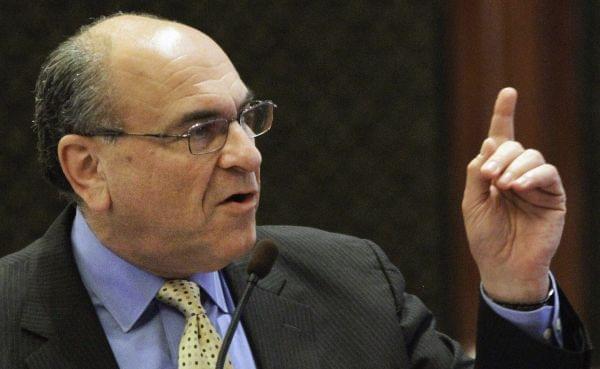Lang: Medical Cannabis Extension Required Sacrifices

In this Aug. 17, 2012 file photo, Illinois state Rep. Louis Lang speaks during a legislative session at the Capitol in Springfield. Seth Perlman/Associated Press
Governor Bruce Rauner signed legislation last week extending Illinois’ medical marijuana pilot program by another two and half years. But the sponsor of the extension in the Illinois House, State Rep. Lou Lang (D-Skokie) says he had to make some sacrifices along the way.
Lang says the extension means the state’s Medical Cannabis Advisory Board will now be re-constituted under the guidance of Illinois Public Health Director Nirav Shah.
He says that on 20 earlier occasions, Shah had ignored the advisory board’s recommendations for additional conditions that allowed patients to receive medical marijuana.
“And therefore, it’s frankly not very likely there are going to be any recommendations of a positive nature," he said. "For me, I think it was important to keep the program going. It was set to expire next year. To change the role of the doctor, cause there are many doctors that weren’t signing recommendations.”
Under the new law extending the medical marijuana program, doctors don’t have to recommend a patient receive a medical marijuana card, but merely acknowledge that he or she has one of the 41 qualifying illnesses in order for them to apply a medical cannabis card through the state.
Post-Traumatic Stress Disorder and terminal illness were added to the medical marijuana program as part of the extension signed by Governor Rauner last Friday.
The addition of PTSD had been ordered by a judge. Seven other lawsuits are pending in Cook County from patients who want to add other conditions, including chronic pain, migraines, and autism.
Lang says more conditions could still be added through legislation.
Links
- Rauner Signs Bill Extending Medical Marijuana Program
- Measure Extending Medical Marijuana Program Passes IL House
- Rauner Reverses Course On Medical Marijuana, Backs Expansion
- Where Illinois’ Medical Marijuana Program Stands
- Medical Marijuana Pilot Program; Long Lines In Airport Security
- Medical Marijuana Site Nearing Completion
- Rauner Administration Again Rejects New Marijuana Conditions
- Champaign Medical Marijuana Dispensary To Open In March
- Illinois Panel OKs Medical Marijuana For Pain Conditions
- Rauner Rejects Additional Conditions for Med Marijuana, Panel Chair Criticizes
- State’s Medical Marijuana Crops Readying For Harvest
- Legislator Hopeful For More Qualifying Illnesses In Med Marijuana Program
- Illinois Medical Marijuana Approved For PTSD, Osteoarthritis, But Not Diabetes
- The Demand For Medical Cannabis In Illinois

